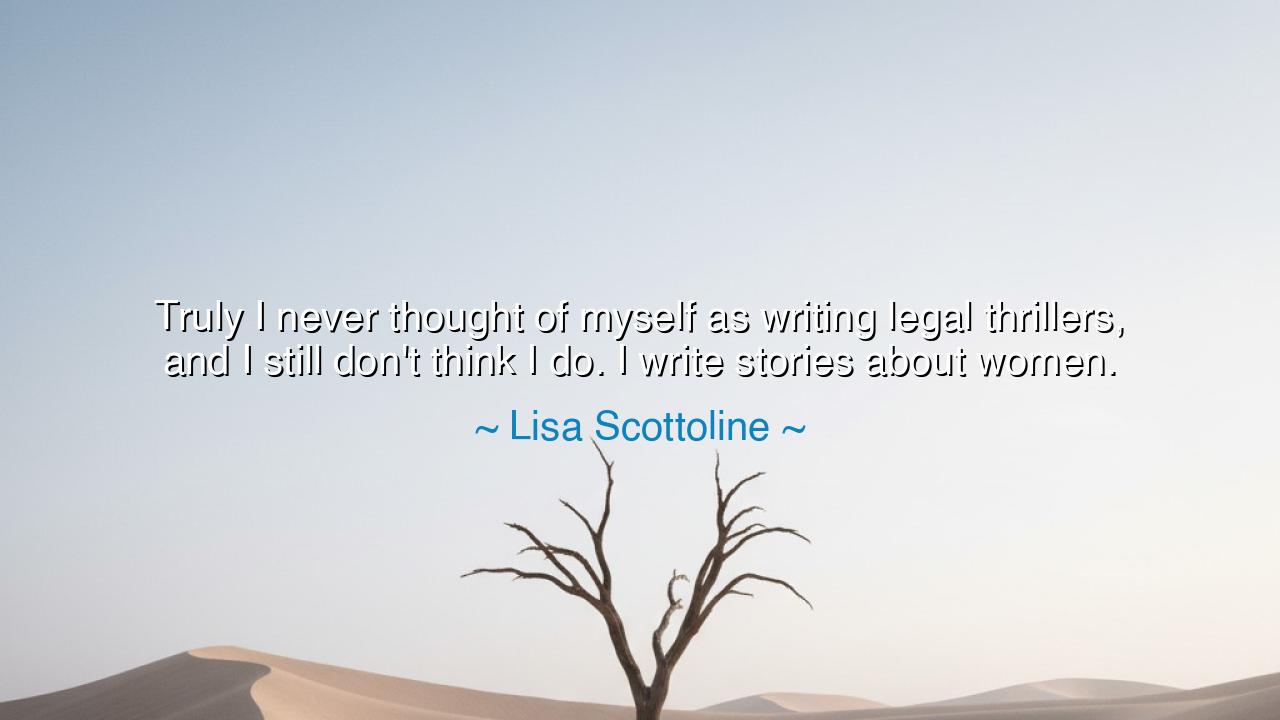
Truly I never thought of myself as writing legal thrillers, and I
Truly I never thought of myself as writing legal thrillers, and I still don't think I do. I write stories about women.






There are times when the world misnames greatness, when it calls by one title that which is truly another. So it was when Lisa Scottoline, the acclaimed author, declared, “Truly I never thought of myself as writing legal thrillers, and I still don't think I do. I write stories about women.” These words are simple, yet they pierce through the illusions of classification and reveal a deeper truth: that art is not defined by its genre, but by its heart. To Scottoline, the courtroom is merely a stage—the true drama lies in the courage, resilience, and wisdom of women who must fight to be heard in a world that too often silences them.
The origin of this quote arises from Scottoline’s journey as both lawyer and storyteller. She was trained in the law, forged in the rigorous halls of justice, but her heart belonged to human stories—the struggles of women balancing duty and desire, ambition and compassion. The world called her works “legal thrillers,” for they featured trials and justice, but she saw in them something older and greater: the eternal story of womanhood, written not in statutes but in the strength of the soul. Her words remind us that the law may govern actions, but it is emotion, love, and perseverance that govern life.
In the spirit of the ancients, her statement echoes the wisdom of those who knew that form is nothing without essence. When Sappho wrote her verses on love and longing, the scholars called them poems—but they were, in truth, hymns to the spirit of woman. When Hypatia lectured on the stars in Alexandria, the men of her age called it science—but it was also an act of courage, a declaration that the voice of a woman could guide the cosmos. So too with Scottoline: what the modern age names “legal thrillers” are, in her hands, epics of endurance, chronicles of the feminine will to survive, nurture, and triumph within the machinery of law and life.
Her words also challenge the narrowness of how the world defines greatness. In every age, society seeks to name and contain what it cannot fully understand. To label Scottoline’s works as mere “thrillers” is to reduce the thunder of experience into a whisper. She reminds us that the true storyteller writes not of events, but of souls, and that her mission is not to entertain, but to bear witness—to the woman betrayed and still loving, to the mother who defends her child with the ferocity of a lioness, to the lawyer who stands before the court not merely for justice, but for dignity. Her stories are not about law—they are about life in its fiercest, most human form.
In the ancient myths, there were always those who redefined their craft. Homer did not write of war alone; he wrote of longing, loyalty, and the endurance of the heart. Sophocles did not simply tell tragedies; he laid bare the moral wounds of humankind. Likewise, Scottoline’s declaration is a reminder to every creator, every worker, every soul: do not let the world define your purpose. Titles, genres, and professions are the outer garments of meaning—the true purpose lies beneath, in the pulse of what drives you. To her, that pulse is womanhood itself—its sorrow and laughter, its courage and tenderness, its unending capacity to rebuild what the world has broken.
Her insight also reveals a universal truth about storytelling and about life: that identity is an act of creation. Just as she refused to be confined by labels, so too must each person reject the definitions others impose. The woman who tends her home, the man who teaches children, the artist, the worker—all are creators, shaping their world in quiet strength. Scottoline’s voice reminds us that to live authentically is to name oneself—to rise above categories and speak the truth of one’s soul without apology.
The lesson she leaves us is both gentle and mighty: define your work by its purpose, not by its appearance. Let your life speak the truth of what you love, and let others name it as they will. For in the end, history remembers not the labels, but the light within the work. Live, then, as Scottoline writes—not bound by form, but guided by heart. And may all who create, nurture, or labor find courage in her wisdom: that greatness is not in what others call you, but in what you choose to stand for.
Thus, her simple confession becomes a timeless teaching. She writes not of “legal thrillers,” but of humanity seen through the eyes of women—of mothers, daughters, fighters, dreamers. And in doing so, she joins the lineage of ancient storytellers who sought not fame, but truth. So remember her words, and pass them to those who come after: live beyond your label, create from your core, and let the spirit of your story outshine the names others give it.






AAdministratorAdministrator
Welcome, honored guests. Please leave a comment, we will respond soon